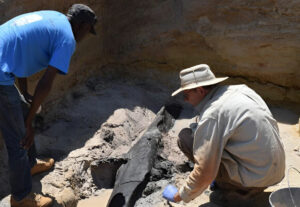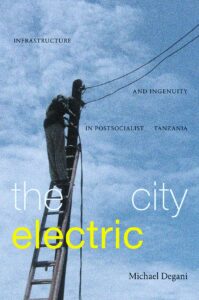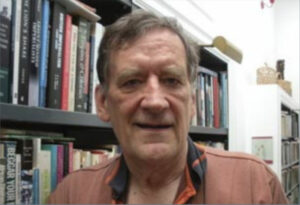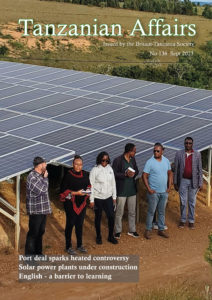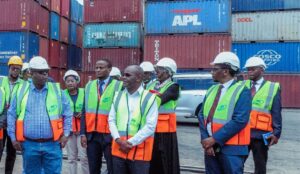by Donovan McGrath
Statesman and saint
(The Tablet – UK) In this section of the publication, readers share their thoughts and stories. The following was submitted by Joy Elder: I was thrilled to read that the Church in Tanzania is calling for the canonisation of Julius Nyerere … I was in Tanzania as a young White Sister just after independence and beyond. Julius Nyerere was, I think, educated partly by White Fathers … His visits to my mission of Sumbawanga were always memorable and delightful and he was my hero. Among all the leaders of the world he was distinguished for his genius in running the country successfully and for being a man of great kindness, talent, humour, integrity and humility. He has always been a saint for me! (16 December 2023) – Thanks to Roger Bowen for this item – Editor
The Tanzanians searching for their grandfathers’ skulls in Germany
(BBC News online – UK) Isaria Anael Meli has been looking for his grandfather’s remains for more than six decades. Extract continues: He believes the skull ended up in a Berlin museum after his grandfather, Mangi Meli, along with 18 other chiefs and advisers, was hanged by a German colonial force 123 years ago. After all this time, a German minister has told the BBC the country is prepared to apologise for the executions in what is now northern Tanzania. Other descendants have also been searching for the remains and recently, in an unprecedented use of DNA research, two of the skulls of those killed have been identified among a museum collection of thousands… [It was] on 2 March 1900 [in a one-time market area for the villagers of Tsudunyi, in a part of what is now called Old Moshi] that, as the descendants tell it, one-by-one the 19 men were hanged. They had been hastily tried the day before, accused of plotting to attack the German colonial forces… Mangi Meli, the most prominent mangi, or chief, among those who were killed, had in 1882 successfully defeated the German forces. That success was later reversed and by the end of the 19th Century, the Europeans were keen to stamp their authority on this part of what was known as German East Africa. They wanted to make an example of Mangi Meli and other local leaders who may have been planning an uprising… While most of the torsos are believed to be buried in a mass grave somewhere near the tree, their heads were at some point removed, packed up and sent 6,600km (4,100 miles) to the German capital. In some cases the complete skeletons were shipped… The lively 92-year-old [grandson] was told about the killing of Mangi Meli by his grandmother, who he says was forced to watch the execution … Since at least the 1960s, Mr Meli had been writing to the German and Tanzanian authorities urging them to look for the remains of his grandfather. He says officials tried to put him off by telling him that relevant records had been destroyed during World War Two. But Mr Meli was not deterred. “… [T]his skull is needed by the whole country – not me, myself, only.” There is a sense of profound loss that goes beyond the idea that this was a historical injustice. Mangi Meli was a chief from the Chagga ethnic group – one of the most prominent in modern-day Tanzania. For the Chagga people, as well as others in the region, the idea that the head was separated from the body and then taken away from the land is deeply disturbing. In Chagga culture the dead are supposed to be buried in the homestead so they can continue to watch over the living. It is believed that the failure to do that could have consequences down the generations… Simulango Molelia, the grandson of another victim of the executions – Mangi Molelia – believes his family is being haunted by the chief’s spirit… Museums and other institutions in 19th and early 20th Century Europe and North America amassed large collections of skulls and other human remains. This was partly driven by huge interest in the now-discredited science of phrenology. It was based on the idea that someone’s fundamental characteristics were reflected in the shape of their skull. In some cases it took on a racist element, with researchers trying to establish a racial hierarchy… As a consequence people began collecting skulls from across the world. Zablon Ndesamburo Kiwelu followed in his late brother’s footsteps and took up the search for the skulls “What the Germans did was not a good thing,” says Zablon Ndesamburo Kiwelu, whose grandfather, Mchili Sindato Kutesha Kiwelu, served as an adviser, or akida, to Mangi Meli and was also hanged… Mr Molelia wants the skull of his ancestor to be brought to Tanzania and “buried in our Chagga tradition”… (29 October 2023)
Joshua Mollel: Tanzania says student killed in Israel by Hamas
(BBC News online – UK) A Tanzanian student initially reported to have been taken hostage by Hamas in Israel is confirmed to have been killed, Tanzanian government says. Extract continues: Joshua Mollel was working as an agricultural intern at a kibbutz which was attacked by Hamas gunmen on 7 October. Tanzania’s Foreign Minister January Makamba says Mr Mollel was killed immediately after he was taken hostage. Fellow student Clemence Felix Mtenga was also killed in the attack… The two Tanzanian students had travelled to Israel just a month before the 7 October attack. It was initially reported that they were among the 240 people taken hostage by Hamas. According to Tanzania officials, around 350 Tanzanians live in Israel, mostly students pursuing agricultural-related studies… (14 December 2023)
Philip Mpango death rumours: Tanzania orders crackdown over VP speculation
(BBC News online – UK) Tanzanian authorities are investigating social media users accused of spreading false information about Vice-President Philip Mpango’s health. Extract continues: Mr Mpango resurfaced … after being absent from public view for over a month, sparking relief and ending widespread rumours he had died. Information Minister Nape Nnauye has ordered investigations into those who spread the speculation. Mr Mpango says he was hurt by the false rumours circulating on social media… There have been mixed reactions regarding the vicepresident’s return and the rumours that surrounded his absence. Some argue the matter was mishandled by the government’s failure to provide clear information about his whereabouts. His absence had sparked widespread concern, with Prime Minister Kassim Majaliwa previously warning citizens against the speculation… [T]he vice-president appeared unannounced at a Sunday service in the capital, Dodoma, saying he was healthy and had not lost any weight. “There have been photos circulating alongside a candle, and claims that I have passed away…”, Mr Mpango said… In 2018, Tanzania enacted tough laws against the spread of “fake news”, which critics see as a way of curbing freedom of expression. This is not the first time there have been rumours about the state of Mr Mpango’s health… (11 December 2023)
DP World in Tanzania: The UAE firm taking over Africa’s ports
(BBC News online – UK) A multimillion-dollar deal signed between Emirati maritime giant DP World and Tanzania … looks set to further entrench the dominance of the United Arab Emirates (UAE) in Africa’s freight industry. Extract continues: Reports of the $250m (£205m) deal first emerged in July, sparking criticism by the opposition that it “violated Tanzania’s constitution and endangers national sovereignty”. Activists petitioned a court to halt the deal and were briefly detained for planning antigovernment protests. The high court in Tanzania’s south-western town of Mbeya dismissed the petition, paving the way for DP World to manage two-thirds of the Dar es Salaam port for the next 30 years. Transport Minister Makame Mbarawa … said there would be no job losses and that Tanzania would retain 60% of earnings. DP World says it expects to triple revenue within a decade and speed up the clearance of vessels from the current average of 12 hours to 60 minutes. Chronic inefficiency, corruption allegations and competition in freight management by neighbouring Kenya are some of the underlying reasons why Tanzania President Samia Suluhu signed off on the agreement… Part of the contention over DP World’s presence in Tanzania is the perception that its operations are undermining local rights and management. DP World Group boss Sultan Ahmed Bin Sulayem said while in Dodoma that the Dar es Salaam port would become a “world-class facility”… DP World remains an anchor for the UAE to extend its geopolitical ambitions across Africa. (23 October 2023)
Investigations launched into killings and evictions on World Bank tourism project
(Guardian online – UK) Extract: … The World Bank is investigating allegations of killings, rape and forced evictions made by villagers living near the site of a proposed tourism project it is funding in Tanzania. The bank has been accused of “enabling” alleged violence by the Tanzanian government to make way for a $150m (£123m) project ministers say will protect the environment and attract more tourists to Ruaha national park. The “resilient natural resource management for tourism and growth” (Regrow) project will almost double the size of the park, which is 130km (80 miles) from the city of Iringa. Villagers living near Ruaha told researchers at the Oakland Institute thinktank that rangers had killed and beaten cattle herders and fishers, had raped women and confiscated thousands of head of cattle, under the premise that they had encroached on the national park. In April 2021, rangers reportedly shot and killed William Nundu, a fisher, and allegedly killed two herders, Sandu Masanja, and Ngusa Salawa, who was only 14 years old. The regional police commander claimed that they were killed by wild animals while illegally entering the park, according to a report published by the institute … More than 21,000 people from dozens of villages around Ruaha are also facing eviction by the government, it claimed. Anuradha Mittal, the executive director of the Oakland Institute, said: “[The] Regrow project is not about protecting wildlife or conservation. Instead, the bank is financing an oppressive and violent economic growth model based on boosting tourism revenues.” Mittal said the World Bank should have scrutinised the Tanzanian government’s record on human rights before financing it. The government authorised evictions close to the same area in 2006 and has been criticised for its handling of forced evictions in northern Tanzania, which “should have triggered internal alarm before the bank decided to finance the project”, added Mittal. “Instead, it looked the other way and continues to do so. It should be held accountable.” The institute said villagers were told in October 2022 they would have to leave their land despite holding title deeds, which the government has cancelled, claiming the property fell within the boundaries of the national park. More than 850 villagers have challenged the evictions in Tanzania’s high court… [Roland Ebole, An Amnesty International researcher focusing on Tanzania and Uganda] said tourism, much of it linked to trophy hunting, has driven a need for the government to take land, even at the expense of the people living there and often without their consent… (28 September 2023)
‘Oldest wooden structure’ discovered on border of Zambia and Tanzania
(Guardian online – UK) Extract: … Researchers have discovered remnants of what is thought to be the world’s oldest known wooden structure, an arrangement of logs on the bank of a river bordering Zambia and Tanzania that predates the rise of modern humans. The simple structure, made by shaping two logs with sharp stone tools, may have formed part of a walkway or platform for human ancestors who lived along the Kalambo River nearly 500,000 years ago. Marks on the logs show they were cut, chopped and scraped with an array of stone tools found at the site. One log, a type of bushwillow, overlies the other and is held in place by a large inverted U-shaped notch in its underside. “When I first saw it, I thought this can’t be real. The wood and the stone suggest a high level of ingenuity, technological skill and planning,” said Prof Larry Barham, an archaeologist at the University of Liverpool who led the work. “It could be part of a walkway or part of a foundation for a platform,” he said. “A platform could be used as a place to store things, to keep firewood or food dry, or it might have been a place to sit and make things. You could put a little shelter on top and sleep there.” Scientists at the University of Aberystwyth dated the structure to at least 476,000 years old, from long before Homo sapiens are thought to have emerged about 300,000 years ago. The structure may be the work of Homo heidelbergensis, a predecessor of modern humans that lived in the region… The findings, published in Nature, are remarkable because wood so rarely survives for long periods. The material at Kalambo Falls was preserved by waterlogged sediments that are starved of oxygen…
(20 September 2023)
The new ‘scramble for Africa’: how a UAE sheikh quietly made carbon deals for forests bigger than UK
(Guardian online – UK) Extract: … The rights over vast tracts of African forest are being sold off in a series of huge carbon offsetting deals that cover an area of land larger than the UK. The deals, made by a little-known member of Dubai’s ruling royal family, encompass up to 20% of the countries concerned – and have raised concerns about a new “scramble for Africa” and the continent’s carbon resources. Such deals can deny the rights of people living on the land to make use of it for their own purposes while providing unclear benefits to the environment. As chairman of the company Blue Carbon, which is barely a year old, Sheikh Ahmed Dalmook al-Maktoum has announced several exploratory deals with African states that are home to crucial wildlife havens and biodiversity hotspots, for land that represents billions of dollars in potential offsetting revenue. The sheikh has no previous experience in nature conservation projects. So far, the deals cover a fifth of Zimbabwe, 10% of Liberia, 10% of Zambia and 8% of Tanzania, amounting to a total area the size of the UK…” … The deals would give the UAE firm the exclusive rights to sell the credits for 30 years, taking 70% of the sale of the credits. Under the rules of the Paris agreement, countries that sold the credits would not be able to use them for their own commitments. Some of those involved in these deals highlighted that carbon markets provide much-needed financial support to African countries where other sources of climate finance were not delivering. However, others raised concerns, saying the size of the land deals amount to “a new scramble for Africa”… (30 November 2023)
Who is Nestory Irankunda? Meet the Bayern Munich wonderkid who suffered life threatening injury on the pitch after leaving a Tanzanian refugee camp for Australia
(Daily Mail online – Australia) Extract: Nestory Irankunda is the wonderkid every Australian football fan is talking about after he landed a huge move to European Powerhouse Bayern Munich. Irankunda, 17, will join the German giants next July after Adelaide United agreed to part ways with the prodigious talent for an A-League record fee of $5.5million. The youngster has made waves in Australia’s domestic scene but his arrival in Germany will certainly raise eyebrows, with very few players making the step up from football’s backwaters to the big stage. But Irankunda’s journey is a unique one that has consisted of challenges from very early on… Born on February 9, 2006 to his father Gideon, a rideshare driver, and his mother Dafroza in Kigoma, Tanzania. The fourth child of seven, Irankunda spent the first three months of his life in a refugee camp, with his family desperate to flee Burundi’s civil war. The Irankundas moved to Perth, West Australia before relocating to Adelaide in South Australia, where Nestory soon discovered his love for football. He played for the Northern Wolves and Parafield Gardens as a junior and his talent was quickly recognised by scouts. Irankunda was snapped up by National Premier League club Adelaide Croaia Raiders, where his performances attracted attention from Airton Andrioli, head of youth at Adelaide United. Irankunda was invited for a trial with the A-League club in 2020 and was offered a place in the club’s academy within a couple of weeks. ‘When you see a boy like Nestory, some players have that naturally,’ Andrioli said. ‘That gift of understanding and reading the game. Being street smart. You don’t see that [in] a lot of Australian players… Irankunda had long been linked to Bayern … ‘We’ve had Nestory on our radar for some time and we’re pleased we’ve reached an agreement with him and Adelaide United on a move to Munich for next summer,’ said Jochen Sauer, Bayern’s director of youth development… (14 November 2023)

